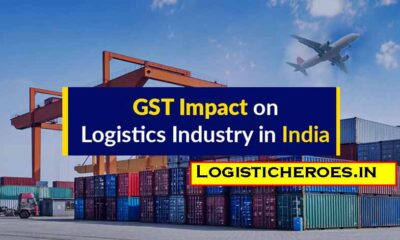You cannot survive if you don’t speak the language of the area. Grab a phrasebook to familiarise yourself with the fundamentals before travelling to a location where the language is strange to you.

logistics blog
Beginning in a new industry can present similar difficulties. Every industry has its jargon, novel terminology, and acronyms that may be confusing to you at first. The vocabulary used in the logistics sector is particularly distinctive and might make newcomers feel bewildered.
If you want to enter the room with a bit more skill and assurance, we’ve compiled a list of supply chain terminologies and acronyms that are widely used in the logistics industry. Every small piece can help to improve your early experiences in the field.
20+ Logistic Industry Terms and Their Explanation
- Intermodal transportation
Intermodal transportation is the practice of transferring cargo using a variety of modes of transportation (ships, railways, planes, etc.).
- Reverse logistics
The practice of transferring items from buyers back to sellers is known as reverse logistics. The process may be completed with either the distributor or the manufacturer, depending on the exact justification for the return.
- Sender and recipient
The entity sending the items is known as the consignor, while the person or business receiving them is known as the consignee. The consignee may also act as a middleman, keeping the items to resell to a third party or end consumer.
- Delivery evidence (POD)
POD is the procedure used to establish the paperwork proving that the supplier, distributor, and client all received the items. This paperwork enables the precise accounting of all the products being carried.

logistics
- Bill of Lading
The bill of lading is located on the reverse of the proof of delivery. The official document that shippers have that contains details about the goods is the bill of lading. Before signing the proof of delivery, the consignee will compare the bill of lading to the shipment they received.
- Value-added tax (VAT)
VAT is a tax that assesses the product’s value at every stage of shipment, from the raw materials used in production to the ultimate sale.
- Load tender
Offering cargo to various carriers to compare prices is known as load tendering. The importance of this procedure lies in its capacity to let shipping businesses consider offers while preserving their option to accept or reject the service.
- Unit Load Apparatus (ULD)
A ULD is a tool for gathering and constraining cargo for air transportation. For the transportation of various pallets and containers, each ULD has a special code.
- All Kinds of Freight (FAK)
Products with multiple freight classifications can be shipped together thanks to the FAK categorization. Because it enables higher-class commodities to travel alongside other goods at a lesser cost, this wide classification is advantageous.
10.Twenty-foot equivalent unit (TEU)
To assess exactly how many goods can fit aboard container ships and terminals, TEU is employed. The TEU calculation will be used by shipping companies to provide pricing.
11.Yard of containers
Before and after sailing, cargo is kept in a container yard. The organising and processing that take place at a container yard is a crucial step in the logistics process, whether containers are entering or exiting.
- Fewer than a truckload (LTL)
LTL, a typical logistics abbreviation for relatively tiny loads or amounts of freight, is used to describe their shipping. LTL services can play a significant role in cost savings for companies that want to send small items.
- Freight forwarder
A freight forwarder is a business that acts as a go-between between the firm sending the goods and their final destination. Freight forwarders typically purchase huge amounts of space on ocean carriers at a discounted rate and then manage all of the document procedures to enable the shipment process to go smoothly.
- Freight forwarder Company
A freight forwarder is a company acting as an intermediary between the original company making the shipment and the final destination for the goods. Generally, freight forwarders buy large quantities of space on ocean carriers at a discount price and then handle all the processing of documents to help make the shipping process run smoothly.
- Advanced shipment notice (ASN)
Shippers send this document (usually via EDI) to the receiver prior to the departure of the shipment. The ASN contains all the information about the upcoming shipment and its contents.
- Chargeable weight
This is the measurement used by freight carriers to determine the price when goods are shipped. Generally speaking, the chargeable weight is connected to the gross weight of a shipment.

Goods parcel through train procedure
- Third-party logistics (3PL)
3PL is a broad term used to describe a company that manages all aspects of logistics, from warehousing to shipping, for another business. Companies hire 3PLs to take care of any facet of logistics.
- Blanket purchase order
A blanket purchase order is an order from a company involving a long-term contract. Instead of making repeat orders individually, companies can set routine shipments from a company for regular intervals of time.
- Automated broker interface (ABI)
The ABI is the primary system for processing trade entries and other electronic documentation. ABI helps facilitate cargo clearance and cargo movement and serves as a repository for shipment data.
Demurrage
A demurrage is an extra charge given to the consignee for various container issues. Some common demurrages are connected to late container returns and overweight or damaged containers.
- Request for Proposal (RFP)
RFPs are documents companies create to attract the best 3PL company for their specific needs. RFPs detail what the company is looking for, a bit of the project specifics/history, and the timelines for the upcoming project.
- Demurrage
Demurrage is an extra charge given to the consignee for various container issues. Some common demurrages are connected to late container returns and overweight or damaged containers.
- Request for Proposal (RFP)
RFPs are documents companies create to attract the best 3PL company for their specific needs. RFPs detail what the company is looking for, a bit of the project specifics/history, and the timelines for the upcoming project.
Final Words
Studying the terms used in the supply chain is simply the first step in a much longer process of learning the ins and outs of this frequently disregarded industry. There are many different occupations and prospects in the field of supply chain management, as you may have deduced from the terminology, some of which are only open to individuals with specific knowledge and training.




























